英美文化学习资料
- 格式:doc
- 大小:109.50 KB
- 文档页数:16
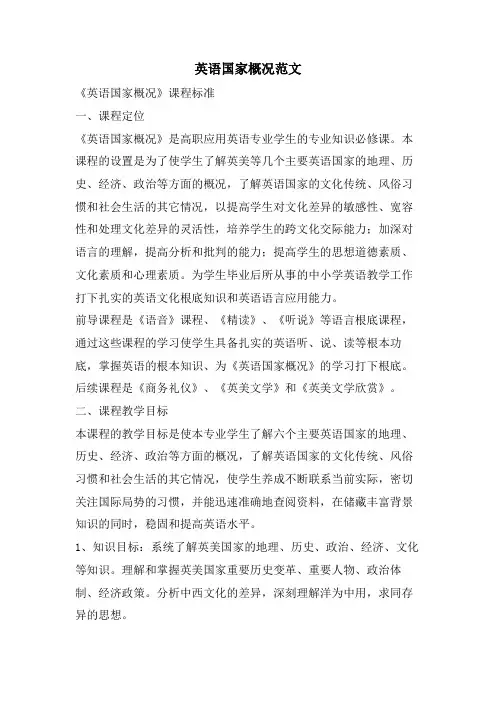
英语国家概况范文《英语国家概况》课程标准一、课程定位《英语国家概况》是高职应用英语专业学生的专业知识必修课。
本课程的设置是为了使学生了解英美等几个主要英语国家的地理、历史、经济、政治等方面的概况,了解英语国家的文化传统、风俗习惯和社会生活的其它情况,以提高学生对文化差异的敏感性、宽容性和处理文化差异的灵活性,培养学生的跨文化交际能力;加深对语言的理解,提高分析和批判的能力;提高学生的思想道德素质、文化素质和心理素质。
为学生毕业后所从事的中小学英语教学工作打下扎实的英语文化根底知识和英语语言应用能力。
前导课程是《语音》课程、《精读》、《听说》等语言根底课程,通过这些课程的学习使学生具备扎实的英语听、说、读等根本功底,掌握英语的根本知识、为《英语国家概况》的学习打下根底。
后续课程是《商务礼仪》、《英美文学》和《英美文学欣赏》。
二、课程教学目标本课程的教学目标是使本专业学生了解六个主要英语国家的地理、历史、经济、政治等方面的概况,了解英语国家的文化传统、风俗习惯和社会生活的其它情况,使学生养成不断联系当前实际,密切关注国际局势的习惯,并能迅速准确地查阅资料,在储藏丰富背景知识的同时,稳固和提高英语水平。
1、知识目标:系统了解英美国家的地理、历史、政治、经济、文化等知识。
理解和掌握英美国家重要历史变革、重要人物、政治体制、经济政策。
分析中西文化的差异,深刻理解洋为中用,求同存异的思想。
2、能力目标:进一步扎实学生的英语根底,扩大词汇量,扩大阅读量,用英语进展展示和演讲,学以致用,加强语言表达的流利性和准确性。
能运用英语讨论和讲解地理、历史等相关的学科知识。
能运用英语分析和阐述与生活严密相关的政治、经济和文化等问题,培养良好的思辨能力。
3、素质目标:增强学生们对文化差异的敏感性和宽容性,及处理这些文化差异的灵活性。
渗透了积极向上的西方人文思想,有利提升学生的人文素养,培养学生独立自信、诚信守法、回报社会的良好操守。
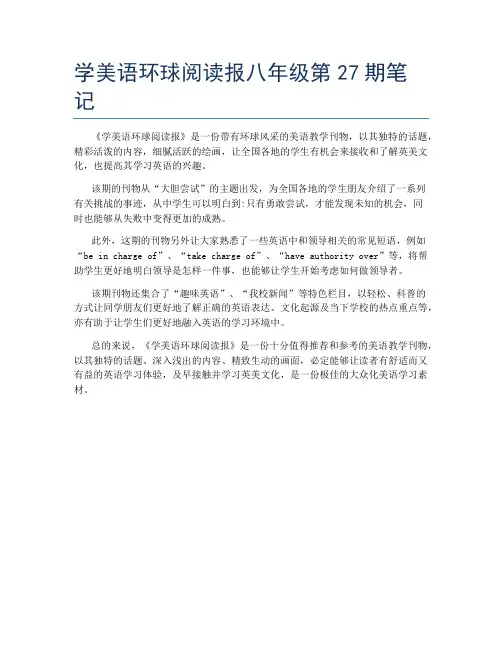
学美语环球阅读报八年级第27期笔
记
《学美语环球阅读报》是一份带有环球风采的美语教学刊物,以其独特的话题,精彩活泼的内容,细腻活跃的绘画,让全国各地的学生有机会来接收和了解英美文化,也提高其学习英语的兴趣。
该期的刊物从“大胆尝试”的主题出发,为全国各地的学生朋友介绍了一系列
有关挑战的事迹,从中学生可以明白到:只有勇敢尝试,才能发现未知的机会,同
时也能够从失败中变得更加的成熟。
此外,这期的刊物另外让大家熟悉了一些英语中和领导相关的常见短语,例如“be in charge of”、“take charge of”、“have authority over”等,将帮助学生更好地明白领导是怎样一件事,也能够让学生开始考虑如何做领导者。
该期刊物还集合了“趣味英语”、“我校新闻”等特色栏目,以轻松、科普的
方式让同学朋友们更好地了解正确的英语表达、文化起源及当下学校的热点重点等,亦有助于让学生们更好地融入英语的学习环境中。
总的来说,《学美语环球阅读报》是一份十分值得推荐和参考的美语教学刊物,以其独特的话题、深入浅出的内容、精致生动的画面,必定能够让读者有舒适而又有益的英语学习体验,及早接触并学习英美文化,是一份极佳的大众化美语学习素材。
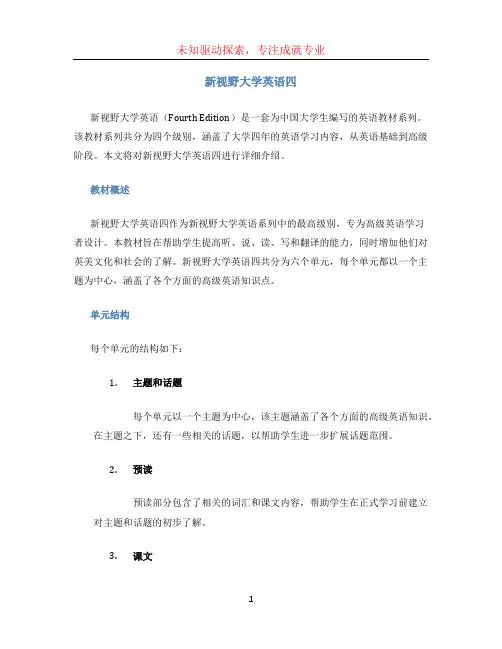
新视野大学英语四新视野大学英语(Fourth Edition)是一套为中国大学生编写的英语教材系列。
该教材系列共分为四个级别,涵盖了大学四年的英语学习内容,从英语基础到高级阶段。
本文将对新视野大学英语四进行详细介绍。
教材概述新视野大学英语四作为新视野大学英语系列中的最高级别,专为高级英语学习者设计。
本教材旨在帮助学生提高听、说、读、写和翻译的能力,同时增加他们对英美文化和社会的了解。
新视野大学英语四共分为六个单元,每个单元都以一个主题为中心,涵盖了各个方面的高级英语知识点。
单元结构每个单元的结构如下:1.主题和话题每个单元以一个主题为中心,该主题涵盖了各个方面的高级英语知识。
在主题之下,还有一些相关的话题,以帮助学生进一步扩展话题范围。
2.预读预读部分包含了相关的词汇和课文内容,帮助学生在正式学习前建立对主题和话题的初步了解。
3.课文课文部分是整个单元的核心内容,其中包含了各种文本类型,如文章、演讲稿、小说片段等。
通过阅读这些课文,学生可以提高自己的阅读理解能力,同时认识到不同文体和文化背景下的英语表达方式。
4.重点词汇与短语在课文之后,会列出本单元所涵盖的重点词汇和常用短语,并给出相应的中文翻译和例句。
学生可以通过学习这些词汇和短语,丰富自己的词汇量,提高英语的运用能力。
5.拓展阅读拓展阅读部分提供了与主题相关的更多文章,供学生进一步阅读和理解。
这些文章来自各种来源,包括报纸、杂志、网站等。
6.语法、写作和翻译每个单元的最后部分涵盖了相关的语法知识点、写作技巧和翻译练习。
通过学习这些内容,学生可以提高自己的语法运用和写作能力,同时培养翻译技巧。
教学方法新视野大学英语四采用多种教学方法,以帮助学生全面提高英语水平。
除了传统的课堂教学,教材还提供了一系列配套的练习和活动,如听力练习、口语对话、阅读理解和写作练习等。
学生可以通过这些练习和活动,提高自己的听说读写能力。
教材优势新视野大学英语四具有以下几个优势:1.全面涵盖高级英语知识本教材涵盖了各个方面的高级英语知识点,包括高级词汇、语法、写作和翻译等。
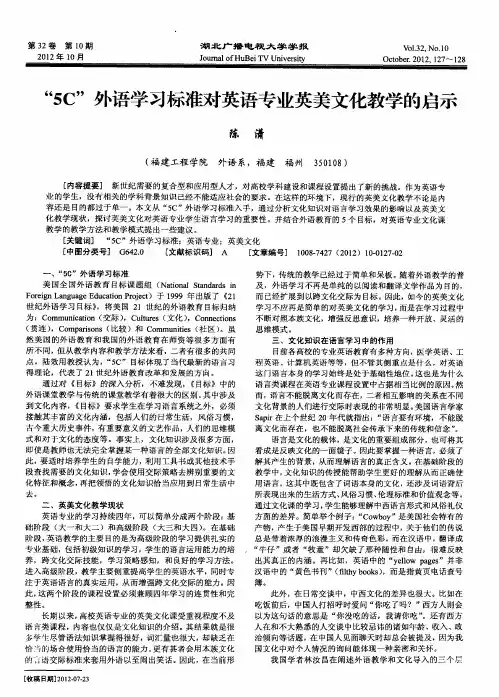
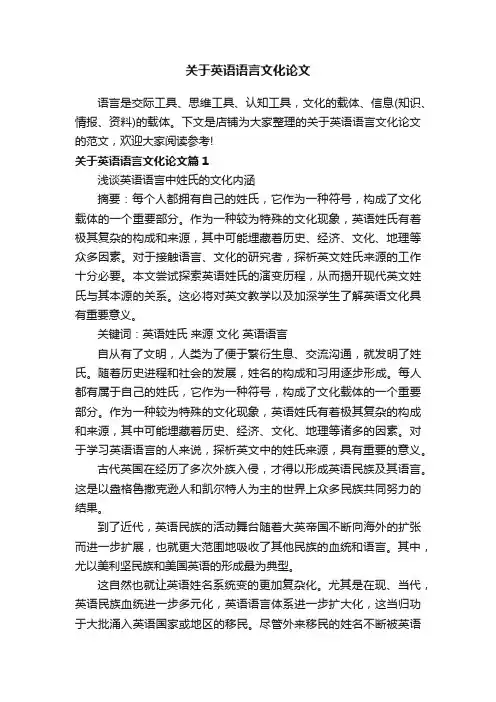
关于英语语言文化论文语言是交际工具、思维工具、认知工具,文化的载体、信息(知识、情报、资料)的载体。
下文是店铺为大家整理的关于英语语言文化论文的范文,欢迎大家阅读参考!关于英语语言文化论文篇1浅谈英语语言中姓氏的文化内涵摘要:每个人都拥有自己的姓氏,它作为一种符号,构成了文化载体的一个重要部分。
作为一种较为特殊的文化现象,英语姓氏有着极其复杂的构成和来源,其中可能埋藏着历史、经济、文化、地理等众多因素。
对于接触语言、文化的研究者,探析英文姓氏来源的工作十分必要。
本文尝试探索英语姓氏的演变历程,从而揭开现代英文姓氏与其本源的关系。
这必将对英文教学以及加深学生了解英语文化具有重要意义。
关键词:英语姓氏来源文化英语语言自从有了文明,人类为了便于繁衍生息、交流沟通,就发明了姓氏。
随着历史进程和社会的发展,姓名的构成和习用逐步形成。
每人都有属于自己的姓氏,它作为一种符号,构成了文化载体的一个重要部分。
作为一种较为特殊的文化现象,英语姓氏有着极其复杂的构成和来源,其中可能埋藏着历史、经济、文化、地理等诸多的因素。
对于学习英语语言的人来说,探析英文中的姓氏来源,具有重要的意义。
古代英国在经历了多次外族入侵,才得以形成英语民族及其语言。
这是以盎格鲁撒克逊人和凯尔特人为主的世界上众多民族共同努力的结果。
到了近代,英语民族的活动舞台随着大英帝国不断向海外的扩张而进一步扩展,也就更大范围地吸收了其他民族的血统和语言。
其中,尤以美利坚民族和美国英语的形成最为典型。
这自然也就让英语姓名系统变的更加复杂化。
尤其是在现、当代,英语民族血统进一步多元化,英语语言体系进一步扩大化,这当归功于大批涌入英语国家或地区的移民。
尽管外来移民的姓名不断被英语同化,但多多少少都会保持原民族的某些特征。
据英美姓名学家统计,如今英语姓名的语源就与三十多个大小语种相关。
下面,我们着重来看英语姓名在其本土的演化发展过程。
在英伦三岛被诺曼底人入侵以前,即公元1006年的诺曼征服前,英国人没有姓,只有名。
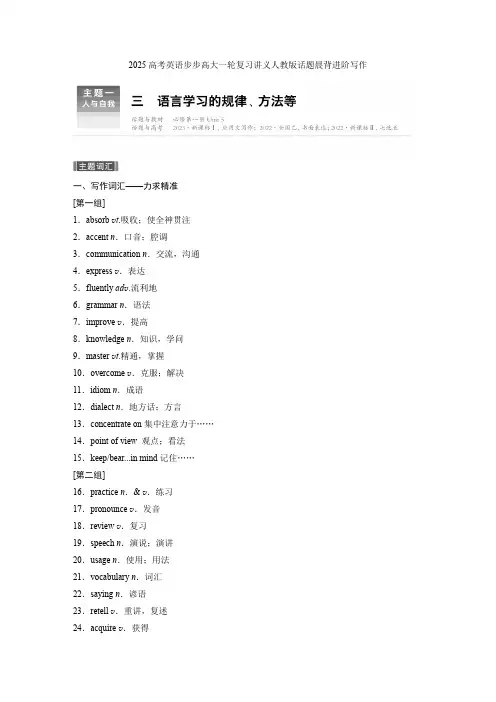
2025高考英语步步高大一轮复习讲义人教版话题晨背进阶写作一、写作词汇——力求精准[第一组]1.absorb v t.吸收;使全神贯注2.accent n.口音;腔调3.communication n.交流,沟通4.express v.表达5.fluently ad v.流利地6.grammar n.语法7.improve v.提高8.knowledge n.知识,学问9.master v t.精通,掌握10.overcome v.克服;解决11.idiom n.成语12.dialect n.地方话;方言13.concentrate on集中注意力于……14.point of view 观点;看法15.keep/bear...in mind记住……[第二组]16.practice n.& v.练习17.pronounce v.发音18.review v.复习19.speech n.演说;演讲20.usage n.使用;用法21.vocabulary n.词汇22.saying n.谚语23.retell v.重讲,复述24.acquire v.获得25.recite v.背诵26.look up查阅27.make progress取得进步28.set/take/write/note down写下,记下29.attach importance to重视30.benefit from从……获益二、阅读词汇——扫除障碍[第三组]31.consult v.咨询;请教32.memorize v.记忆33.standard n.& adj.标准(的)34.dictation n.听写35.skim v.浏览;略读36.scan v.& n.扫描;浏览37.summary n.摘要;概要38.remark n.& v.评述;谈论;评论39.classify v.分类;归类40.error n.错误,谬误41.resource n.资料,(教学)资源42.informal adj.(书写或言谈)非正式的43.symbolic adj.象征的;符号的;使用符号的44.globalization n.全球化45.means n.方式;方法;途径三、拔高词汇——高人一筹(学四六级词汇)[第四组]46.explicit adj.清楚明白的;易于理解的47.precise adj.准确的;精确的;确切的48.seminar n.研讨会49.alphabet n.字母表;字母50.enlarge v t.使扩大51.capitalized adj.大写的52.stutter n.结巴,口吃53.oral adj.口头的,口述的54.verbal adj.口头的;言语的;动词的;照字面的55.forum n.(因特网上的)论坛,讨论区56.extinction n.灭绝;消失;消灭;废止57.course n.科目;课程58.semester n.学期;半年59.interpreter n.解释者;口译者;注释器60.have a frog in one’s throat (尤因喉咙痛)说话困难1.The way to learn a language is to practice speaking it as often as possible.学习一门语言的方法就是要尽可能经常地练习说它。
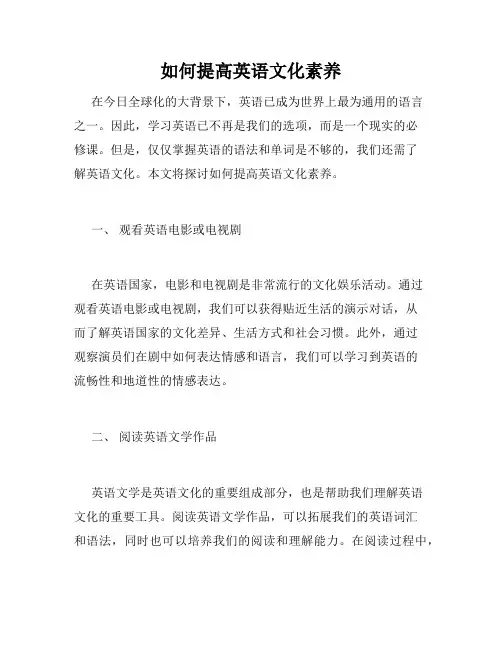
如何提高英语文化素养在今日全球化的大背景下,英语已成为世界上最为通用的语言之一。
因此,学习英语已不再是我们的选项,而是一个现实的必修课。
但是,仅仅掌握英语的语法和单词是不够的,我们还需了解英语文化。
本文将探讨如何提高英语文化素养。
一、观看英语电影或电视剧在英语国家,电影和电视剧是非常流行的文化娱乐活动。
通过观看英语电影或电视剧,我们可以获得贴近生活的演示对话,从而了解英语国家的文化差异、生活方式和社会习惯。
此外,通过观察演员们在剧中如何表达情感和语言,我们可以学习到英语的流畅性和地道性的情感表达。
二、阅读英语文学作品英语文学是英语文化的重要组成部分,也是帮助我们理解英语文化的重要工具。
阅读英语文学作品,可以拓展我们的英语词汇和语法,同时也可以培养我们的阅读和理解能力。
在阅读过程中,我们可以从中领悟出英语文学作品中所蕴含的文化价值观和历史背景,从而理解英美文化。
三、参与英语演讲或Debate参加英语演讲或Debate的活动可以帮助我们提高口语表达的能力和思维逻辑能力。
不仅如此,这些活动也是很好的平台,能让我们与不同文化背景的人交流,从而更好地了解他们的文化和习惯。
四、交流学习与母语非英语的人交流也是一种提高英语文化素养的好方法。
在这样的交流过程中,我们可以探讨语言和文化差异,从中了解到不同文化和语言的背景和地位。
在这方面,我们可以利用线上和线下的相互交流,加强与母语非英语的人的交流。
总之,提高英语的文化素养对于我们的成长和发展有着重要的影响。
通过观看英语电影,阅读英语文学,参与英语演讲和交流学习,我们可以不断拓宽自己的知识视野,提高我们的英语文化素养。
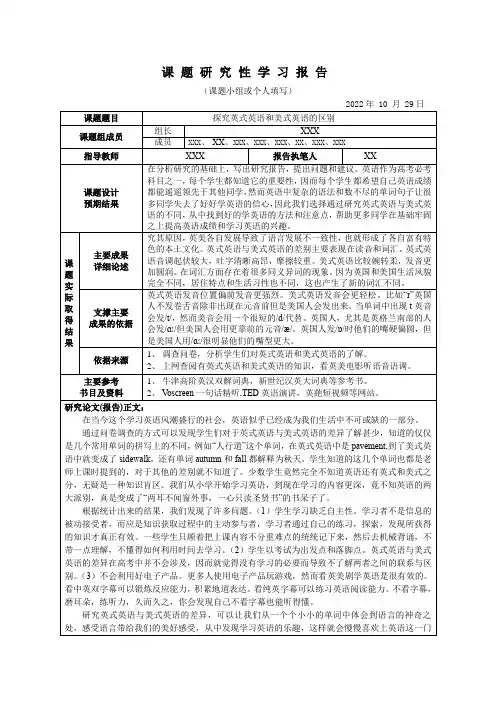
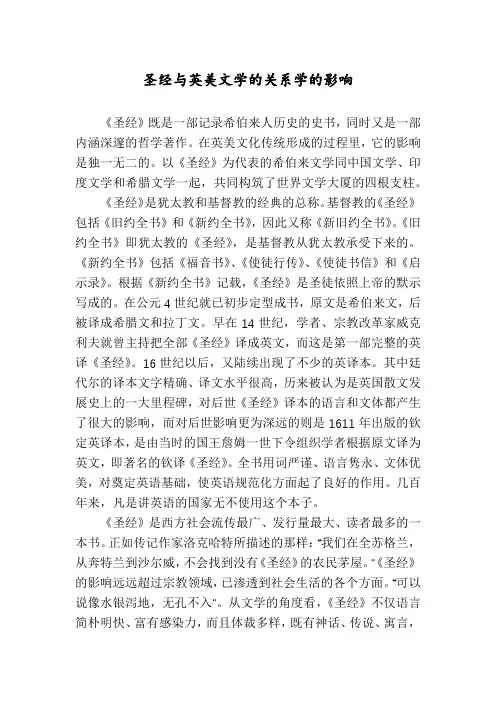
圣经与英美文学的关系学的影响《圣经》既是一部记录希伯来人历史的史书,同时又是一部内涵深邃的哲学著作。
在英美文化传统形成的过程里,它的影响是独一无二的。
以《圣经》为代表的希伯来文学同中国文学、印度文学和希腊文学一起,共同构筑了世界文学大厦的四根支柱。
《圣经》是犹太教和基督教的经典的总称。
基督教的《圣经》包括《旧约全书》和《新约全书》,因此又称《新旧约全书》。
《旧约全书》即犹太教的《圣经》,是基督教从犹太教承受下来的。
《新约全书》包括《福音书》、《使徒行传》、《使徒书信》和《启示录》。
根据《新约全书》记载,《圣经》是圣徒依照上帝的默示写成的。
在公元4世纪就已初步定型成书,原文是希伯来文,后被译成希腊文和拉丁文。
早在14世纪,学者、宗教改革家威克利夫就曾主持把全部《圣经》译成英文,而这是第一部完整的英译《圣经》。
16世纪以后,又陆续出现了不少的英译本。
其中廷代尔的译本文字精确、译文水平很高,历来被认为是英国散文发展史上的一大里程碑,对后世《圣经》译本的语言和文体都产生了很大的影响,而对后世影响更为深远的则是1611年出版的钦定英译本,是由当时的国王詹姆一世下令组织学者根据原文译为英文,即著名的钦译《圣经》。
全书用词严谨、语言隽永、文体优美,对奠定英语基础,使英语规范化方面起了良好的作用。
几百年来,凡是讲英语的国家无不使用这个本子。
《圣经》是西方社会流传最广、发行量最大、读者最多的一本书。
正如传记作家洛克哈特所描述的那样:“我们在全苏格兰,从奔特兰到沙尔威,不会找到没有《圣经》的农民茅屋。
”《圣经》的影响远远超过宗教领域,已渗透到社会生活的各个方面。
“可以说像水银泻地,无孔不入”。
从文学的角度看,《圣经》不仅语言简朴明快、富有感染力,而且体裁多样,既有神话、传说、寓言,又有诗歌、杂文、短篇小说,还有书信、演讲和布道;表现手法更是丰富多彩,从隐喻、象征、夸张到讽刺和似是而非的论点等等,因此文学家们历来公认《圣经》本身就是一部优秀的文学作品,是极为重要的世界文化遗产,也是西方文化的一个重要源泉。
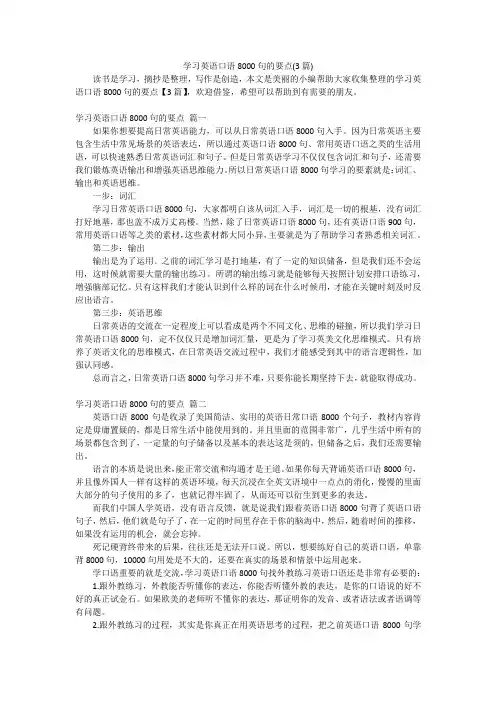
学习英语口语8000句的要点(3篇)读书是学习,摘抄是整理,写作是创造,本文是美丽的小编帮助大家收集整理的学习英语口语8000句的要点【3篇】,欢迎借鉴,希望可以帮助到有需要的朋友。
学习英语口语8000句的要点篇一如果你想要提高日常英语能力,可以从日常英语口语8000句入手。
因为日常英语主要包含生活中常见场景的英语表达,所以通过英语口语8000句、常用英语口语之类的生活用语,可以快速熟悉日常英语词汇和句子。
但是日常英语学习不仅仅包含词汇和句子,还需要我们锻炼英语输出和增强英语思维能力。
所以日常英语口语8000句学习的要素就是:词汇、输出和英语思维。
一步:词汇学习日常英语口语8000句,大家都明白该从词汇入手,词汇是一切的根基,没有词汇打好地基,那也盖不成万丈高楼。
当然,除了日常英语口语8000句,还有英语口语900句,常用英语口语等之类的素材,这些素材都大同小异,主要就是为了帮助学习者熟悉相关词汇。
第二步:输出输出是为了运用。
之前的词汇学习是打地基,有了一定的知识储备,但是我们还不会运用,这时候就需要大量的输出练习。
所谓的输出练习就是能够每天按照计划安排口语练习,增强脑部记忆。
只有这样我们才能认识到什么样的词在什么时候用,才能在关键时刻及时反应出语言。
第三步:英语思维日常英语的交流在一定程度上可以看成是两个不同文化、思维的碰撞,所以我们学习日常英语口语8000句,定不仅仅只是增加词汇量,更是为了学习英美文化思维模式。
只有培养了英语文化的思维模式,在日常英语交流过程中,我们才能感受到其中的语言逻辑性,加强认同感。
总而言之,日常英语口语8000句学习并不难,只要你能长期坚持下去,就能取得成功。
学习英语口语8000句的要点篇二英语口语8000句是收录了美国简洁、实用的英语日常口语8000个句子,教材内容肯定是毋庸置疑的,都是日常生活中能使用到的。
并且里面的范围非常广,几乎生活中所有的场景都包含到了,一定量的句子储备以及基本的表达这是须的,但储备之后,我们还需要输出。
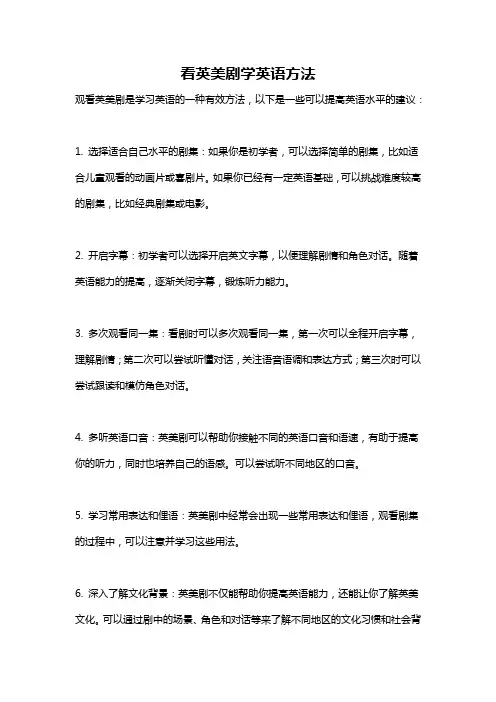
看英美剧学英语方法
观看英美剧是学习英语的一种有效方法,以下是一些可以提高英语水平的建议:
1. 选择适合自己水平的剧集:如果你是初学者,可以选择简单的剧集,比如适合儿童观看的动画片或喜剧片。
如果你已经有一定英语基础,可以挑战难度较高的剧集,比如经典剧集或电影。
2. 开启字幕:初学者可以选择开启英文字幕,以便理解剧情和角色对话。
随着英语能力的提高,逐渐关闭字幕,锻炼听力能力。
3. 多次观看同一集:看剧时可以多次观看同一集,第一次可以全程开启字幕,理解剧情;第二次可以尝试听懂对话,关注语音语调和表达方式;第三次时可以尝试跟读和模仿角色对话。
4. 多听英语口音:英美剧可以帮助你接触不同的英语口音和语速,有助于提高你的听力,同时也培养自己的语感。
可以尝试听不同地区的口音。
5. 学习常用表达和俚语:英美剧中经常会出现一些常用表达和俚语,观看剧集的过程中,可以注意并学习这些用法。
6. 深入了解文化背景:英美剧不仅能帮助你提高英语能力,还能让你了解英美文化。
可以通过剧中的场景、角色和对话等来了解不同地区的文化习惯和社会背
景。
7. 与他人交流讨论:观看剧集后,可以与朋友或英语母语者讨论剧情、角色和情节,用英语交流和表达自己的观点,这样能够更好地巩固知识。
最重要的是要保持学习的兴趣和耐心,坚持不懈地观看英美剧,逐渐提高英语能力。
英语语言文化意识的培养英语在国际化、全球化的大环境下变得越来越重要,文化意识是对英美文化、社会形态和价值观的整体了解。
在新的学习中,明确提出了要加强英语语言文化意识的培养。
但是目前,我们在文化意识的培养中还有一些问题,必须要吸取教训,加强文化意识的培养。
随着经济全球化成为主流趋势,人们越来越意识到掌握一门国际通用语言英语的重要性。
我国在改革开放后,越来越多的参与到世界的大舞台中,如WTO的加入,2008年的北京奥运会和2010年的上海世博会等等。
这一点在中国的课本中有充分的体现。
长期以来,我们在英语学习中,重点让学习的是语法、词汇等方面的知识,培养的是纯语言能力,而忽略了英语文化意识的培养。
所谓的文化意识,就是对目标语文化的社会规约、价值观和信念的知晓。
在《英语课程标准》中,文化意识被作为是基础英语教育间断的目标内容之一,而且在目标描述和内容标准中,详细地描述了文化意识的具体内容,就是形成跨文化交际的文化意识及对应的基本交际能力,进而拓宽自身视野,从国际性的角度去考虑问题,使得民族使命感以及爱国主义精神得以强化,树立正确而健全的价值观,奠定日后发展的良好基础。
按照人们对文化知晓的程度,我们将其分为四个层次。
首先,学习者对于较为明显的某种文化特征有一定了解,但是却认为文化意识具有奇特性,无法理解。
第二层次中,经过两种或两种以上文化之间的冲突,学习者能了解到这些文化与本土文化之间存在的不同,还能了解到一些微妙而极具意义的文化特征,但是仍然不能理解。
第三层次是经过理性分析后,可以了解到一些微妙而具有意义的文化特征,从认知角度出发,认为是可以理解的。
最后一个层次中,通过深入地体验目标语文化,能设身处地地从该文化的视角来看待问题,基本达到感同身受的理解。
美国著名人类学家古德诺夫在他的作品《文化人类学与语言学》中提及:一个社会的语言是该社会文化的一个方面,语言和文化属于部分和整体的关系。
也就是说,语言和文化之间有密切的联系。
学习英语的最佳方法是什么英语的学习是一个长期坚持的过程,除了日积月累的学习英语,还需要找到英语学习的最佳方法。
以下是店铺分享给大家的学习英语的最佳方法的资料,希望可以帮到你!学习英语的最佳方法一、“四勤”1.勤背诵。
积极记忆高中课本中出现的生词及词组,理解其用法,并适当运用一些正、反义词对比,相似词对比等方式加强记忆。
这一步虽然枯燥乏味,但少了它,学习英语就像折了翅膀的鹰,空有雄心却寸步难行。
2.勤朗读。
这是学好英语的法宝之一。
朗读的内容一般说来只限于课本,并不以背诵为目的,而着重将注意力集中于自己的正确发音、连续语气等等。
通过朗读可以熟悉单词及其用法,体会英语的语气、语境,增强语感。
每天只需半小时左右,但须持之以恒。
3.勤练习。
虽然“题海”战术不足取,但适当做一些练习,尤其是针对自己不足之处的练习是必不可少的,比如完形填空这种难度较大、考查综合能力的题型,平时就应多做一些。
每次做完后,认认真真地重新对照答案细细抠一遍,体会这些正确选项究竟合理在什么地方,出题者的意图又是在考查哪些知识点等等。
只有在不断的练习、体会中,英语水平及应试能力才会不断提高。
4.勤总结。
相对于其它学科来说,英语的知识点相当零碎,一定要在平时的收集、整理、总结上下功夫。
平时听老师提到或是在参考书上看到的一些零碎的小知识都要及时记录下来,以备以后复习时用。
二、“四多”1.多看。
近年来英语试题的难度逐渐增大,试题的触角涉及到日常生活的各个领域,因此,从高一开始就应尽可能地扩大阅读面,广泛阅读,以求开阔视野,并在潜移默化中提高自己的英文水平。
2.多听。
近年的中、高考已逐步加入听力试题。
其实,多听并不仅仅是为了应试,更重要的一点就是在听的过程中可以逐步增强语感。
培养敏锐的语感将有助于增强辨析力和判断力,是英语学习过程中十分重要的一环。
3.多说。
多说可以增强口语能力,加深记忆,使学过的知识清晰地映在脑海里,不容易被忘记。
4.多练。
通过做大量的习题,可以增强实践经验,不至于临阵发慌,手足无措。
浅谈英语教学中的文化导入摘要:在基础教育阶段,英语教学中的文化教学至少应该包括两个方面的内容:一是文化知识的传授,一是跨文化意识的培养。
文化知识的传授主要通过在英语教学中导入文化的内容,也称文化导入。
英语教师可采用多元化的、富有吸引力的文化导入方式学习课文,激发起学生学习英语的兴趣,为英语学习奠定良好的基础。
关键词:中学英语教学语言文化文化教学中图分类号:g633.41 文献标识码: c 文章编号:1672-1578(2012)10-0111-011 文化导入的重要性众所周知,语言是文化的一个特殊组成部分,是人们彼此之间进行交流的工具,也是人与文化融为一体的媒介。
它是随着人类社会的发展而发展。
人类用语言创造了文化,文化反过来促进人类社会的发展,同时丰富了语言的表达方式。
自古以来,人类社会积累下来的文化遗产给语言打下了深刻的烙印。
语言是人类社会中的语言,与人类社会和人类文化息息相关,密不可分。
2 文化导入的内容在外语教学中,文化是指所学语言国家的历史地理、风土人情、传统风俗、生活方式、文学艺术、行为规范、价值观等。
在起始阶段,应使学生对英语国家文化及中外文化的异同有粗略的了解,教学中涉及的英语国家文化知识,应与学生身边的日常生活密切相关,并能激发学生学习英语的兴趣。
在英语学习的较高阶段,要通过扩大学生接触异国文化的范围,帮助学生拓展视野,使他们提高对中外文化异同的敏感性和鉴别能力,进而提高跨文化交际能力。
3 文化导入多的方法文化导入的方法主要有以下几种:3.1注释学生学习英语主要通过教材进行,因此,在教材中对涉及到具有文化特异性的内容应加以注释和讲解。
学生学习英语的时间主要在课堂上,平时很少接触语言环境,遇到与课文相关多的文化背景知识时,往往会感到费解。
在备课时精选一些典型内容及教学相关的文化信息材料,将他们恰到好处地运用到课堂上,以增强教学的知识性、趣味性,加深学习内容的深度与广度,激发学生的求知欲,活跃课堂气氛。
西方文化教育的心得体会篇一:学习西方文化的感想学习>有感罗国正 1106100069 网工112班这学期,我选修了夏老师的《西方文化》这门课。
无论是中国文化还是西方文化,都有着非常悠久的历史和传统。
如果从克里特文明开始算起,西方文明已有4500多年的历史了;而我们中国更是有着悠悠五千年的文明史。
回顾这短短的十节课,真是受益匪浅啊。
正如著名传播学者麦克卢汉所说,我们生活在“地球村”上。
而在当今这样一个高速发展的社会中,“村民们”彼此的交流和沟通显得尤为重要。
我们不仅要学好国际性语言、打破“巴别塔”的限制,更要了解彼此悠久的文化传统。
我个人认为,虽说历史就是一个扬弃的过程,但学习文化则需要兼容并包。
并不是说要取其糟粕,而是只有透彻地了解了彼此的文化内涵才能够也才有资格做出“去”或“取”的判断。
西方文化是从古希腊文化讲起的,涉及古希腊文化、古罗马文化、中世纪的宗教文化、文艺复兴、宗教改革和启蒙运动的理性文化、现代社会的多元文化等。
其中古希腊文化最主要的包括了古希腊战争,古希腊艺术和古希腊神话。
古希腊文化作为古典文化代表,在西方乃至世界都占有极其重要地位,其灿烂程度影响力,长久的生命力似只有中华文明方可比拟。
古希腊文化的主要特点是理想主义、人文主义、理性主义、悲剧性和雄伟性。
古希腊的一个重要的美学思想就是和谐是美,古希腊人很早就提出黄金比例的观点,并运用于绘画雕刻。
文艺复兴的核心思想就是人文主义,希腊人重视个人价值,追求自由,享乐,希腊神话中就经常出现半神般的英雄。
希腊人也是奔放的,拥有所谓的“酒神情绪”。
理性色彩还是比较突出的,希腊人将这运用到哲学,思考世界的本原,探讨悖论的逻辑,运用到科学,研究杠杆、滑轮、浮力,发现数的奥秘。
自身的追求与命运的矛盾,就形成悲剧。
荷马史诗就是悲剧的代表,阿喀琉斯和赫克托尔是两种典型的悲剧人物。
前者是自身追求与命运矛盾,后者是自身思想与国家使命矛盾。
悲剧不是侧重写悲,而是写悲壮雄伟。
English in mind的总体教学理念、课程目标和设计思路完全与我国《新课标》英语课程的目标要求相吻合。
English in mind第一级(Level 1)结束的水平与新《课标》要求的5级吻合,包括词汇量、语法点、阅读篇幅、句子结构等,相当于普通全日制小学小升初优秀水平;可推荐参加剑桥KET考试。
English in mind第三级(Level 3)结束的水平与新《课标》要求的6-7级吻合,包括词汇、语法、句法、阅读篇章等,相当于英语中考优秀水平;可推荐参加剑桥PET考试。
English in mind第五级(Level 5)的中间水平与新《课标》要求的8级吻合,五级结束与新《课标》9级吻合,包括词汇、语法、句法、阅读篇章等,相当于高考英语的优秀水平;可推荐参加剑桥FCE考试,FCE考试成绩被全世界超过400家高等教育机构作为入学的英语语言标准。
与其他同类教材相比,English in mind作为外国语学校的教材的突出优势有:1、English in mind 是一套综合性、系统性、立体化、国际化的英语语言学习教材,该教材注重听、说、读、写、语音、语法、词汇、日常用语等各项语言技能的训练与提高。
语言地道、原汁原味,选材新颖、与时俱进。
2、该教材能够真正懂得青少年的需求,能够把青少年的心理和生理发展融合到语言教学的规律之中,让教师深刻了解学生的成长特点,拉近师生距离,让课堂更受学生的欢迎。
3、这套教材是真正意义上的资源库的概念,配套资源相当齐全,对于教师备课、上课来说,能节省大量查找资料的时间。
其他同类教材几乎很少有这么全的配套资源。
4、这套教材是系统教程和考级教程的完整统一。
从系统性方面,该教材注重学思结合,倡导启发式、探究式、讨论式、参与式教学,帮助学生学会学习。
激发学生的好奇心,培养学生的兴趣爱好,营造独立思考、自由探索的良好环境。
从阶段性评估和考级方面,不同级别的出口又能对应剑桥通用英语五级考试。
《英美文化及影视欣赏》学习需邓周魁司海维刘琳求的调查(山东农业大学外国语学院,山东泰安271018)摘要:本文报告了对山东农业大学157名学生就《英美文化及影视欣赏》课程学习需求状况进行的一次调查。
结果表明:该课程适合大二学生选修,教学模式以大班多媒体教学与小班非固定桌椅教室教学相结合的方式为好:电影应选择故事性强、内容健康、难度适中、无汉语字幕但有英语字幕的英语原声电影;教师在授课中应对电影的相关背景知识及其中的词汇、俚语、难懂的句子进行讲解,同时应认真组织课堂教学,以提高教学效果。
关键词:非英语专业英美文化及影视欣赏学习需求l引言语言是文化的载体,学习语言也是学习文化的过程。
从某种意义上来说,电影是包罗万象的文化载体,是文化的传播者,且影视作品生动形象,有真实的语境和故事情节.能提高学生学习的兴趣,因此将英语电影引入教学可以帮助学生更好地理解外国文化,提高英语水平.故许多高校都开设了《英美文化及影视欣赏》这门课程。
《英美文化及影视欣赏》是一门对非英语专业学生开设的语言文化类选修课,该课程对于加强文化教学,提高学生英语水平具有现实意义。
但由于很多教师思想上不够重视.对学生的学习需求不了解,往往一厢情愿地选择自认为重要的教学内容和教学手段等,致使该课程没有在教学实践中达到应有的效果。
为全面客观地了解学生对《英美文化及影视欣赏》课程的学习需求,探讨该课程学习的有效途径,笔者采用问卷调查方式对山东农业大学选修该课程的学生进行了调查,以期为该课程进行教学改革提供依据,探讨新型的教学模式。
2调查设计2.1调查对象及形式本次问卷调查的对象是山东农业大学2006--2007学年第二学期选修《英美文化及影视欣赏》的非英语专业本科学生。
参考有关文献并结合本选修课实际情况自行设计问卷。
在正式调查前进行了预调查,问卷的信度和效度均在0.8以上。
问卷共分两部分11个问题:第一部分为被调查者信息,包括其专业、年级、性别及对英语和英美文化是否喜爱等:第二部分为被调查者对该课程的开课时间、开课频率、开课方式、课程参与方式、希望得到的收获、希望教师补充的内容及在课堂上关注的内容等。
Chapter One English HistioryI. Choose the Correct Answer from Each of the Following.1. In the year 1066, William the Conqueror invaded England from France, defeating the Saxon king Harold atC .A. the Battle of Crecy C. the Battle of HastingsB. the Battle of Agincourt D. the Battle of Waterloo2. One of the following did not take place during the Middle Ages. It was D .A. the Norman Conquest C. the Hundred Years WarB. the Crusades D. the “Gunpowder Plot”3. The most famous of the English Crusaders was the Norman king, A .A. Richard Lion-Heart C. King ArthurB. King John D. Alfred the Great4. For much of the Middle Ages, Britain was ruled by a (n) B aristocracy.A. English-speaking C. German-speakingB. French-speaking D. Gaelic-speaking5. In England, the Protestant Reformation began with B .A. King John C. Queen ElizabethB. Henry VIII D. Bloody Mary6. Shakespeare lived in the period of C .A. the Middle Ages C. the Elizabethan ageB. the Victorian age D. the Industrial Revolution7. The defeat of the Spanish Armada by the English navy took place during C .A. the Middle Ages C. the Elizabethan ageB. the “grab for Africa” D. the Victorian age8. T he “Gunpowder Plot” took place in the reign of A .A. James I C. Henry VIIIB. Elizabeth I D. Charles I9. The king who believed the “Divine Right” to govern, and who was condemned to death during the English Civil War was C .A. Henry VIII C. Charles IB. James I D. James II10. During the whole of the eighteenth century, England’s great enemy was B .A. Spain C. AmericaB. France D. Germany11. One of the following did not take place during the eighteenth century in British history. It was D .A. great victories over France C. the loss of her American coloniesB. the Industrial Revolution D. the founding of the modern police force12. The Reform Bill in the eighteenth century in British history was made to A .A. extend the franchise C. encourage inventionsB. develop trade unions D. improve social services13. One of the following was not a characteristic of the Victorian age. DA. It was an age of national development and national optimism.B. It was an age of stability in family life.C. It was an age of imperialism.D. It was an age of lack of belief in religion.14. One of the following did not take place between the two world wars in British history. It was A .A. the “suffragette” movementB. the independence of the southern part of IrelandC. the great “slump”D. the General Strike15. Which of the following did not take place after the Second World War in British history? CA. The independence of the colonies of the old British empireB. The availability of TV sets and cars to almost every homeC. The “suffragette” movementD. The founding of the “Welfare State”II. Fill in the Blanks1. The Crusades were a series of wars in which armies from all over Europe tried to snatch the “” (i. e. Palestine, where Jesus Christ once lived) from the .2. In British history, the great rivals of the king’s authority during the Middle Ages wereand the local chiefs, called .3. All the kings of the Middle Ages in Britain spoke as their mother tongue, and after the Hundred Years’ War, the language took its place.4. During the Hundred Years’ War between England and France, English bowmen defeated the heavily armed French knights in the famous Battles of and , and the whole of France very nearly fell into English hands.5. The sixteenth century was the age of great voyages of discovery. and were the two great sailors who started the age of discovery.7. Protestantism gradually became the dominant faith in Britain in the reign of .8. Most people associate the Elizabethan age with two things. The first is .The other is .9. The greatest sailor who led the English fleet to victory in fighting the Spanish Armada was .10. The English Civil War resulted in the temporary overthrow of the , and the country became for morethan ten years a sort of republic founded by .11. In the English Civil War, the “Roundhead” supported while the “Cavalier” supported.14. The longest reign in British history was the monarch of the great Queen Victoria, which lasted from the yearto .15. The Origin of Species was written by .17. After World War II, the first two colonies of the old British Empire that became free were ___ and .III. Explanation1. the Hundred Years’ War(1) A war between England and France which lasted, on and off, for a hundred years from 1337 to 1453. (2) It wasfought entirely in France, and the whole of France very nearly fell into English hands in the famous battles of Crecy and Agincourt. (3) Eventually, partly through the inspiration of the brave girl Joan of Arc, and partly through the effective use of guns, the French drove the English from their land for good.2. the Catholic Church(1) It refers to the Christian church headed by the Pope. (2) All members of the church accept the gospel of Christand the teachings of the Bible. Any revolt against the traditional Christian faith was “heresy.” (3) In the Middle Ages, the Pope was extremely powerful. (4) In the sixteenth century, some of the actual beliefs and practices of the Catholic Church were questioned by Protestant doctrines and there was a great deal of persecution by Catholics. 3. the Elizabethan age(1) It refers to the period during the reign of Elizabeth I in British history. (2) It was an age of real literaryachievement, especially that of Shakespeare, and (3) it was an age of adventure on the sea.AnswersI . Choose the Correct Answer from Each of the Following1.;2.;3. A;4. B;5. B;6. C;7. C;8.A;9. C; 10. B; 11. D; 12. A; 13. D; 14. A; 15. CII. Fill in the Blanks1.; the Muslims2. the Church; barons3. French; English4. Crecy; Agincourt5. Columbus; Vasco da Gama7. Elizabeth I8. literature; adventure on the sea9. Sir Francis Drake10. monarchy; Oliver Cromwell11. the Parliament; the King (or King CharlesI)14. 1837; 190115. Charles Darwin17. India; PakistanChapter Two British Government SystemI. Choose the Correct Answer from Each of the Following1. Queen Elizabeth n is “Defender of the Faith”, because ______.A. she is the spiritual leader of the Church of EnglandB. she is the head of the Church of EnglandC. she is the personification of the state.D. she is the symbol of the English values.2. Which of the following is not true?A. The Queen holds meetings of the Privy Council.B. The Queen receives reports of cabinet meetings in her weekly sessions with the Prime Minister.C. The Queen must take sides when a dispute arises in the Cabinet.D. The Queen is informed and consulted on every aspect of national life.3. Which of the following is not true?A. The Queen is a symbol of the parliamentary democracy.B. She is a symbol of British culture.C. She is a symbol of English tradition.D. She is a symbol of English way of life.4. Which of the following is not a part of the Conventions of the constitution?A. The powers of the Crown are exercised mainly by Ministers.B. The Queen must act on the advice of Ministers.C. MPs enjoy freedom of speech in debate.D. Ministers are responsible to Parliament for their actions.5. How often does the General Election take place?A. At least every three years. C. At least every five years.B. At least every four years. D. At least every six years.6. Why are so many party members elected to Parliament in each Election in Britain?A. Because party members usually enjoy better reputation.B. Because party members have more experience in forming a government.C. Because party members have the backing of nationwide organizations.D. Because people trust party members to a greater degree.7. The executive power is in the hands of _____.A. Parliament C. the Cabinet headed by the Prime MinisterB. the House of Commons D. the Queen8. The real centre of power in Parliament is _____.A. the Queen C. the House of LordsB. the House of Commons D. the Cabinet9. Which of the following is not one of the functions that Parliament plays?A. To serve as the final court of appeal in civil cases and criminal cases.B. To make laws.C. To control and criticize the executive government.D. To control the raising and the spending of money.10. The real power of the British government lies in _____.A. the House of Commons C. the Prime MinisterB. the Cabinet headed by the Prime Minister D. the Queen11. Which of the following is the Act that restricted the powers of the Lords in dealing with money?A. The Parliament Act of 1901 C. The Bill of Rights in 1689B. The Parliament Act of 1911 D. The Act of Settlement in 170112. The real power of the House of Lords lies in ____.A. helping to pass money bills C. discussing billsB. delaying bills D. being Supreme Court13. Which of the following is not correct?A. The Speaker presides over the meetings in the House of Commons and sees that procedure is followed.B. The Speaker has the highest power in the House of Commons, he usually takes sides and joins the debates.C. The Speaker controls the debates, seeing that Members do not stray too far from the subject of debate.D. The Speaker interprets the rule of procedure and settles any disputes as to whether things are beingproperly done.14. According to the text, which of the following is the most important privilege enjoyed by MPs?A. Freedom of speech in Parliament. C. High living standards.B. High social status. D. Involvement in law-making.15. Which of the following sentences in true?A. The two big parties have been successful in expanding their powers over recent years.B. The strength of the big parties remains unchanged.C. Members of the two big parties no longer dominate Parliament.D. The two big parties have declined over recent years.II. Fill in the Blanks1. __________ is the oldest secular institution in the United Kingdom.2. A1l English official documents bear the initials OHMS which stands for _________.3. The highest of all honors conferred by the British Queen is __________.4. The British Constitution consists mainly of the following five parts mentioned in the text:(1)__________; (2)__________; (3)__________; (4)__________ and(5)__________.5. A General Election takes place at least every __________ years. In each General Election, ________ are elected members of Parliament.6. Parliament in Britain, strictly speaking, consists of three elements 1)______; (2)________;(3)________.7. The supreme law-making authority in Britain is _________.12. The Queen usually acts on the advice of ___________.13. The executive power of the government is vested mainly in the __________.14. The real centre of power in Parliament is ______; the excusive government is responsible to ______.15. The House of Lords has no Power where ______ Bills are concerned. All other Bills the Lords can only holdup for ________.17. Parliament has three main functions: (1)___________; (2)___________ and (3)_________.18. The present monarch of Britain is _________, her role mainly ___________.III. Explain Each of the Following in English1. British Parliament(1) It includes three elements: the Crown, the House of Lords and the House of Commons. (2) It is the supreme law-making authority in Britain. (3) The real centre of parliamentary power is in the House of Commons. (4) Other functions include: to control and criticize the executive government; to control the raising and the spending of money.2. the British Constitution(l) It is unwritten. (2) Its components include Acts of Parliament, the Prerogative of the Crown, Conventions of the Constitution, Common Law and Parliamentary Privilege. (3) It is more flexible than the written ones in other countries.3. General Election(1) General Election is held at least every five years. (2) The country is divided int0 635 constituencies, each of which returns one Member of Parliament. (3) The one who has the most votes in a constituency becomes a Member of Parliament. (4) The leader of the party with the largest number of members returned to the House of Commons becomes Prime Minister.AnswersI. Choose the Correct Answer from Each of the Following1) B; 2) C; 3) A; 4)C; 5)C; 6)C; 7)C; 8)B; 9)A; 10)A; 11)B; 12)D; 13)B; 14)A; 15)DII. Fill in the Blanks1. The monarchy2. On Her Majesty’s Service3. the Most Noble Order of the Garter4. Acts of Parliament, the Prerogative of the Crown, Conventions of the Constitution, Common Law, Parliamentary Privilege.5. five; 635.6. the Crown, the House of Lords, the House of Commons.7. Parliament11. The Lord Chancellor12. her ministers13. Cabinet 14. the House of Commons, Parliament15. Money, a year .17. to make laws, to control and criticize theexecutive government, to control the raising and the spending of money.18. Queen Elizabeth II; symbolic.Chapter 3 English LiteratureI. Choose the Correct Answer from Each of the Following1. Among the following four great English poets, who does not belong to the trio of English poetry giants?A. Chaucer. C. Milton.B. Shakespeare. D. Shelley.2. Which of the following was a realistic writer?A. Jonathan Swift C. Percy B Shelley.B. Daniel Defoe. D. Thomas Hardy.3. The King James Bible __________.A. was written by King James IB. Was translated by King James IC. was translated under the order of King James ID. was directed by King James I4. What flourished in Elizabethan age more than any other form of literature?A. Drama. C. Poetry.B. Novel. D. Essay.5. Which of the following is a tragedy written by Shakespeare?A. Twelfth Night. C. The Tempest.B. Othello. D. Richard II.6. Which of the following is generally considered as one of the masterpieces by Milton?A. Samson Agonistes C. Canterbury Tales.B. King Lear. D. Don Juan.7. Which of the following was the bitterest satirist?A. Walter Scott. C. Jonathan Swift.B. Daniel Defoe. D. Jane Austen.8. Which of the following was Scottish in origin, and wrote in Scottish dialect?A. Robert Burns. C. William M. Thackeray.B. Edmund Burke. D. George Bernard Shaw.9. Jonathan Swift’s Gulliver’s Travels _____.A. was a novel of hard thrusting satire against the weakness of human beingsB. was a bo ok of the author’s experiences of travels.C. was a children’s book with no political significanceD. was a book about the author’s religious life10. Which of the following was not written by Jane Austen?A. Wuthering Heights. C. Pride and Prejudice.B. Sense and Sensibility. D. Emma.11. Among the following writers, who did not belong to the 20th century?A. John Galsworthy. C. E. M. ForsterB. D. H. Lawrence. D. Oscar Wilde12. When did English literature begin?A. Around 700B.C. C. Around the 8th century.B. After the Norman Conquest. D. Around the 6th century.13. Johnson and James Boswell were twin stars in the 18th century because_____.A. they were good friends.B. they wrote hooks togetherC. Boswell was a writer in his own right and he was as famous as JohnsonD. Boswell wrote Johnson’s biography and became a major literary figure in his own right.14. The writer of The Mill on the Floss was_____.A. Robert Louis Stevenson C. William GoldingB. George Eliot D. W. Somerset Maugham15. Several gifted women have played a part in 20th-century fiction. Which of the following is an exception?A. George Eliot. C. Katherine MansfieldB. Virginia Woolf. D. Elizabeth Bowen.II. Fill in the Blanks1. The study of English literature usually begins with_____.2. The roots of English literature lie deep in the tales of_____ and other Scandinavian countries.3. In the sixteenth century, the most famous writer was_____ who wrote a book called_____ telling of a journey to an imaginary island.4. The most famous work by John Bunyan was called_____.5. Three poets who brought the romantic movement to its height were_____, _____, and_____.6. _____ is regarded as the most important playwright after Shakespeare.7. The use of stream of consciousness was first started by_____, whose masterpiece was_____.8. Name two of the plays written by George Bernard Shaw:_____, _____.9. The author of Vanity Fair was_____; Alice’s Adventures in Wonderland was done by_____; Charles Dickens wrote_____ and _____ among many other works; The Importance of Being Earnest was written by_____. The representative work of E. M. Forster was_____.10. Shakespeare’s plays fall into three categories. They are____, _____, and_____. Name one play out of each category: _____,_____, _____.11. _____ i s generally regarded as Chaucer’s masterpiece.12. Daniel Defoe was most famous for _____.13. Emily and Charlotte are noted for their novels _____ and _____ which are largely the love stories of a woman for man.14. D. H. Lawrence was one of the most controversial writers of the early 20th century, _____, one of his finest novels, wasbased partly on his own life.Tragedy: Hamlet, King Lear, OthelloComedy: A Midsummer Night’s DreamAs You Like ItTwelfth NightChronicle: Richard IIIPlays: Henry VJulius CaesarIII. Explanations1. The Canterbury Tales(1) It is the masterwork of the English poet Geoffrey Chaucer. (2) It is the most important work in Middle English Literature.(3) It is a collection of stories told with superb poetic craft. (4) It gives a cross-section of medieval life.2. William Shakespeare(1) He was an English dramatist and poet in the Elizabethan age. (2) He is generally regarded as the greatest playwright in English literature. (3) His plays fall into three categories: tragedy, such as Hamlet, King Lear, Othello; comedy, such as A Midsummer Night’s Dream,As You Like It ,Twelfth Night; and chronicle plays, such as Henry V, Julius Caesar.3. Romantic Literature of the 19th century(1) It refers to a movement in literature during the first third of the 19th century. (2) The central figures of this movement are Wordsworth, Coleridge, Byron, Keats and Shelley. (3)Their writings are characterized by rich imagination and strong feeling.4. Victorian literature(1) It refers roughly to the literature produced during the reign of Queen Victoria. (2) The romantic spirit ceased to be aleading influence. (3) Historical and philosophical writing continued to flourish along with poetry and fiction. (4) Satire and protest against evils in society became strong elements. (5) The later years of the period saw modern kinds of realistic writing and some authors who showed a new, deeper understanding of character.AnswersI. Choose the Correct Answer from Each of the Following1. D;2. D;3. C;4. A;5. B;6. A;7. C;8. A;9. A; 10. A; 11. D; 12. A; 13. D; 14. B; 15. AII. Fill in the Blanks1. Beowulf2. Denmark3. Thomas More; Utopia4. Pilgrim’s Progress5. Lord Byron, John Keats; Percy Shelley6. George Bernard Shaw7. James Joyce, Ulysses8. Major Babara, Man and Superman9. William M. Thackeray; Lewis Carroll; David Copperfield, Oliver Twist;Oscar Wilde; A passage to India 10. comedies; tragedies; historical plays;Twelfth Night, King Lear, Julius Caesar11. The Canterbury Tales12. Robinson Crusoe13. Wuthering Heights; Jane Eyre14. Sons and LoversChapter 4 Character and MannersI. Choose the Correct Answer from Each of the Following1. To other Europeans, the best known quality of the British, and in particular of the English, is .A. reserve C. sense of humorB. modesty D. sportsmanship2. If you meet a stranger from Britain, which of the following questions can you ask him?A. How old are you? C. How often do you travel abroad?B. When did you buy your watch? D. What’s your salary?3. In Britain, the following conducts are considered ill-bred except .A. loud speechB. self-praiseC. exchanging handshakes on a first introductionD. laughing at a cripple4. In Britain, if a person is very good at tennis, and someone asks him if he is a good player, he will seldom reply.A. I’m not bad. C. I think I’m quite good.B. Yes. D. Well, I’m very keen on tennis.5. English sense of humour is characterized by .A. self-praise C. self-deprecationB. self-confidence D. self-exaggeration6. Humor is highly prized in England, however, the English do not laugh at .A. one’s own faults C. one’s own failuresB. one’s own ideals D. a tragedy7. Which of the following is not true about the typical Englishman?A. He likes to think of himself as more reliable.B. He distrusts exaggerated promises.C. He is distrustful of any kind of self-praise.D. He doesn't expect reserve in others.8. The terms such as “never hit a man when he’s down” and “playing fair” reflect a sense of .A. humor C. sportsmanshipB. modesty D. responsibility9. Which of the following is not true about the English class system?A. It is an embarrassing subject for English people.B. Working-class students cannot receive a university education.C. The class system is much less rigid than it was.D. The class system still exists below the surface.10. The most obvious difference between the working class and the middle class in England is their .A. dress C. workB. accent D. meal11. British habits of politeness are on the whole very .A. informal C. formalB. complicated D. odd12. If you are invited to an evening meal in a British home, which of the following is considered impolite?A. To arrive early.B. To arrive ten minutes late.C. To pay attention to table manners.D. To take your leave between ten and eleven o' clock.13. In Britain, you can usually offer money to .A. a driver who gives you a liftB. someone who stops to help you to mend a punctureC. someone who gives you first aidD. railway porters who carry your baggage14. If old people are respected in Britain, it is because .A. old age and seniority command authority among the BritishB. modern development needs the experience of old peopleC. old people are felt to be in need of protection and supportD. they always keep pace with the times15. Which of the following is not true about politeness in Britain?A. British greetings are complicated.B. British people do not readily ask each other to do anything which would involve real inconvenience.C. The British are rather particular about table manners.D. Politeness towards women is less observed today than it used to he.II. Fill in the Blanks1. Geographically speaking, the people of the and , especially the Welsh, are much less reserved than those of the and in Britain.2. Within their hearts, the English are perhaps no less conceited than anybody else, but in their relation with others they value at least a show of .3. Prince Philip once said that is “God’s greatest gift to mankind.”4. Boxing, rugby, association football, hockey, tennis and cricket were all first organized and given rules in the country .5. The middle class in Britain consists chiefly of _ _ and of all kinds. The working class consists chiefly of and workers.6. In England, middle-class people using slightly varying kinds of which is the kind of English spoken by ____ announcers and taught to overseas pupils. Typical working-class speak in many different __ accents, which are generally felt to be rather ugly and uneducated.7. One of the biggest barriers of social equality in England is the education system. To have been to a “public school” immediately marks you out as one of the class.III. Explanations1. English sportsmanship(1) Sportsmanship is an English ideal that is highly valued in Britain. (2) Sportsmanship is the ability topractise a sport in obedience to its rules, while also showing generosit y to one’s opponent and good temper in defeat. (3) Sportsmanship as an ideal is applied to life in general. This is proved by the number of sporting terms used in ordinary speech.2. English class system(1) As a social convention, the English class system is much less rigid than it was, but it still exists below thesurface. (2) Br oadly speaking, it means there are two classes, the “middle class” and t he “working class”. The middle class consists chiefly of well-to-do business men and professional people of all kinds; the working class consists chiefly of manual and unskilled workers. (3) The most obvious difference between them is in their accent. The middle classes also tend to live a more formal life than working-class people, and are usually more cultured.AnswersI. Choose the Correct Answer from Each of the Following1. A;2. C;3. C;4. B;5. C;6. D;7. D;8. C;9. B; 10. B;11. A; 12. A; 13. D; 14. C; 15. AⅡ. Fill in the Blanks1. North; West; South; East2. modesty3. a sense of humor4. Britain5. well-to-do business men; professional people;manual; unskilled6. received pronunciation; BBC; local7. two-class; middleChapter 5 EducationⅠ. Choose the Correct Answer from Each of the Following1. In Britain, the great majority of parents send their children to .A. public schools C. State schoolsB. private schools D. voluntary schools2. In British education, boys and girls are usually separated in .A. inf ants’ schools C. universitiesB. junior schools D. university colleges3. The “eleven plus” is the examination taken by children in their last year at .A. nursery school C. prep schoolB. primary school D. secondary school4. In the examination called th e “eleven plus”, studen ts with the highest marks go to .A. grammar schools C. secondary modern schoolsB. technical schools D. public schools5. If a student wants to go to university in Britain, he will take the examination called .A. the Certificate of Secondary EducationB. the Ordinary level of the General Certificate of EducationC. the Advanced level of the General Certificate M EducationD. the common entrance examination6. Public schools in England are usually attended by those whose parents are .A. rich C. both rich and politically conservativeB. politically conservative D. liberal7. About of income of British universities is provided by the State.A. one-quarter C. three-quartersB. half D. one-third8. Which of the following is not a characteristic of Open University?A. It is open to everybody.B. It is non-residential.C. Lectures are broadcast on TV and radio.D. No university degree is awarded.9. Which of the following is a feature of British education as a whole?A. Education is chaotic.B. Education is very expensive.C. Education is highly centralized.D. Education is rather independent and enjoys a great deal of freedom.10. Which of the following does not reflect the characteristic of freedom in British education?A. No centralized control from the central government.B. The different types of schools.C. The diverse system of university degrees.。